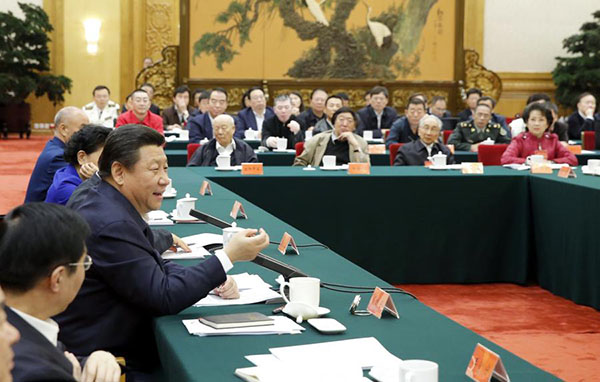Art must present socialist values: Xi
(Xinhua) Updated: 2014-10-15 21:10
 |
|
Chinese President Xi Jinping presides over a symposium that gathered some of the country's most renowned authors, actors, scriptwriters and dancers in Beijing, capital of China, Oct. 15, 2014. [Photo/Xinhua] |
BEIJING - Chinese President Xi Jinping on Wednesday called on artists to present socialist core values in their works.
"Fine art works should be like sunshine from blue sky and breeze in spring that will inspire minds, warm hearts, cultivate taste and clean up undesirable work styles," said Xi, at a symposium that gathered some of the country's most renowned authors, actors, script writers and dancers.
Life-like works should be created so as to tell people in an "covert but influential" way what should be praised and what should be denied, he said.
Art works should also present patriotism as the main theme and foster correct viewpoints of history, nationality and culture, as well as strengthen pride in being Chinese, according to the president.
Xi said that "pursuit of the true, the good and the beautiful" is the mission of artists as the best works of art "touch people, baptize their soul and enable them to find beauty in nature, life and their minds."
This can "lead people to live a life abiding by the code of morality," he said.
Xi noted that traditional Chinese culture is the lifeblood of China and an important source of socialist core values, as well as "a foundation for China to compete in the world."
Artists were also urged to learn from outstanding art worldwide.
"Chinese art will further develop only when we make foreign things serve China, and bring Chinese and Western arts together via thorough understanding," said Xi.
He urged Communist Party of China (CPC) committees to "fully implement the Party's art policy" and "select eligible cadres who have both ability and political integrity, and work well with art workers."
Party officials must respect artists' personality and their works, and build and environment for them to be productive, he said.
Xi also called for the strengthening of art criticism, urging critics to judge art works by artistic and aesthetic standards with historical and people's perspectives.
- Govt encourages people to work 4.5 days a week
- Action to be taken as HIV cases among students rise
- Debate grows over reproductive rights
- Country's first bishop ordained in 3 years
- China builds Tibetan Buddhism academy in Chengdu
- Authorities require reporting of HIV infections at schools
- Typhoon Soudelor kills 14 in East China
- Police crack down on overseas gambling site
- Debate over death penalty for child traffickers goes on
- Beijing to tighten mail security for war anniversary







